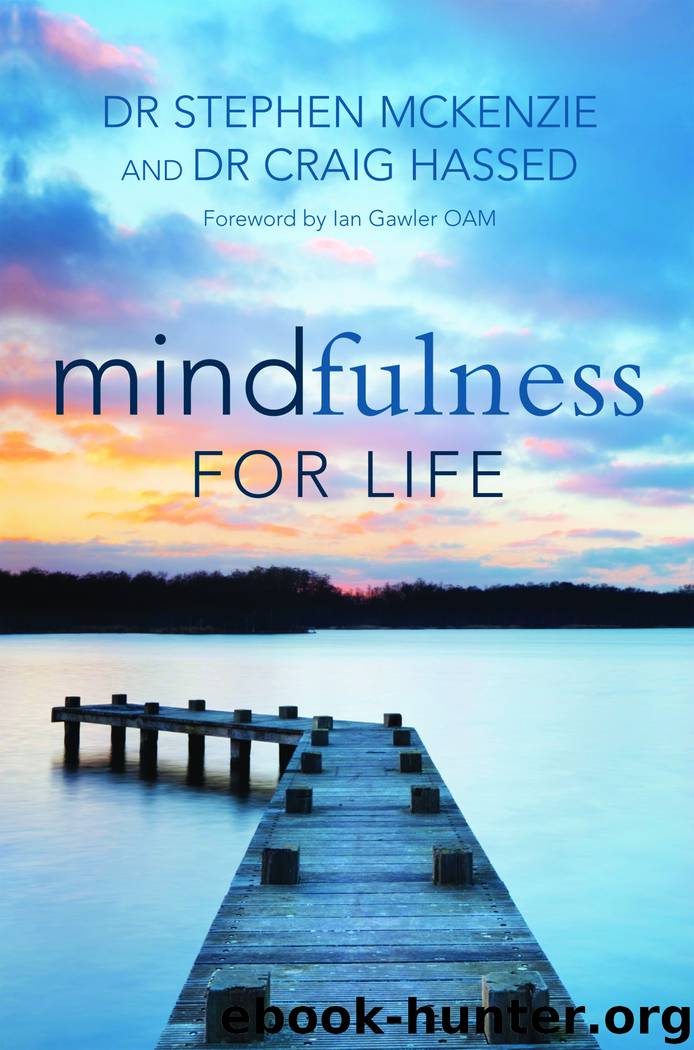Mindfulness for Life by Dr. Stephen McKenzie

Author:Dr. Stephen McKenzie
Language: eng
Format: epub
Tags: Self
ISBN: Mindfulness for Life
Publisher: Exisle Publishing Pty Ltd
Published: 2008-12-31T16:00:00+00:00
Lifestyle change
In Chapter 17 we deal with some of the details and how-tos of using mindfulness for lifestyle change, but there are a few points to make here. Firstly, lifestyle matters for cancer—a lot! This is both in terms of getting it in the first place and the progression of the cancer after we get it. For example, the World Cancer Research Fund in the United Kingdom makes the following lifestyle recommendations for the prevention of cancer.[1]
1. Be as lean as possible without becoming underweight.
2. Be physically active for at least 30 minutes every day.
3. Calorie restriction: avoid sweet drinks and limit energy-dense foods, particularly processed foods high in added sugar, low in fibre or high in fat.
4. Eat more of a variety of vegetables, fruits, whole grains and pulses such as beans.
5. Limit red meat, for example, beef, pork and lamb (maximum of 500 grams per week) and avoid processed meat.
6. Limit alcoholic drinks to two for men and one for women a day.
7. Limit consumption of salty foods and food processed with salt.
A series of studies by renowned American researcher Dean Ornish and his team have revealed the importance of healthy lifestyle change after the time of cancer diagnosis. He had already demonstrated that healthy lifestyle change helps reverse the progression of heart disease, but his original study on cancer was for men with early prostate cancer (biopsy positive and raised PSA) who chose not to have treatment (the watch-and-wait option). That’s not unreasonable for prostate cancer because many of these are very slow-growing and will never become a major threat. In such an instance a man would be monitored regularly and if the cancer markers go up then he would be advised to have the surgical and other treatments. In Ornish’s study, 92 men were randomly allocated to either the lifestyle change (experimental) group or the usual treatment (control) group with no advice to change lifestyle.[2] (It’s a little bewildering and concerning that most cancer patients are still not advised, and sometimes are misadvised, about the importance of lifestyle change for cancer.)
The Ornish lifestyle intervention was:
1. Vegan diet: fruits, vegetables, whole grains, legumes and soy; 10 per cent calories from fat (low in saturated or animal fats); supplemented by soy (tofu with plentiful phyto-oestrogens), fish oil (3 grams daily—a good source of omega-3 fatty acids) and antioxidants (vitamin E: 400IU daily), selenium (200mcg daily) and vitamin C (2 grams daily).
2. Exercise: walking for 30 minutes six times weekly.
3. Stress management including gentle yoga, meditation, breathing and progressive muscle relaxation.
4. One-hour support group weekly.
The level of lifestyle change for the patients already with cancer is probably more rigorous than would be generally recommended for preventing cancer. Ornish emphasised the importance of the meditation and stress-management components of the program, because to him it was central in being able to make and maintain the other necessary lifestyle changes. This is also because making lifestyle changes can be stressful in itself, at least in the initial stages until the benefits
Download
This site does not store any files on its server. We only index and link to content provided by other sites. Please contact the content providers to delete copyright contents if any and email us, we'll remove relevant links or contents immediately.
| Acupuncture & Acupressure | Aromatherapy |
| Ayurveda | Chelation |
| Chinese Medicine | Energy Healing |
| Healing | Herbal Remedies |
| Holistic | Homeopathy |
| Hypnotherapy | Massage |
| Meditation | Naturopathy |
| Reference |
Inner Engineering: A Yogi's Guide to Joy by Sadhguru(5897)
The Power of Now: A Guide to Spiritual Enlightenment by Eckhart Tolle(4755)
Fear by Osho(4085)
The Art of Happiness by The Dalai Lama(3384)
The Ultimate Bodybuilding Cookbook by Kendall Lou Schmidt(3320)
Yoga Therapy by Mark Stephens(3222)
Ikigai by Héctor García & Francesc Miralles(3141)
The Little Book of Hygge by Meik Wiking(3080)
Why Buddhism is True by Robert Wright(2826)
The Healing Self by Deepak Chopra(2796)
Being Aware of Being Aware by Rupert Spira(2706)
Shift into Freedom by Loch Kelly(2692)
Wild Words from Wild Women by Stephens Autumn(2589)
Work Clean by Dan Charnas(2562)
Happiness by Matthieu Ricard(2524)
The Hatha Yoga Pradipika (Translated) by Svatmarama(2482)
Yoga Body & Mind Handbook by Jasmine Tarkeshi(2464)
More Language of Letting Go: 366 New Daily Meditations by Melody Beattie(2444)
Why I Am Not a Feminist by Jessa Crispin(2239)
